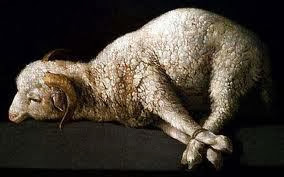“How lovely is Your tabernacle, O Lord of hosts! My soul longs, yes, even faints for the courts of the Lord; my heart and flesh cry out for the living God!” (Psalm 84:1-2)
When I was a child, I stepped into church with such
a sense of wonder. The light streaming from the stained glass windows, each one
showing a different picture of the life of Christ, made me think light was
streaming from heaven. I loved the smell of the candles burning and the
quietness that filled the room as everyone knelt in prayer. I tiptoed in,
believing that God was there.
I can only imagine what it must have been like to
walk into the outer courtyard of the tabernacle in the days of King David. As
you passed through the gate, your eyes would have been drawn to a huge bronze
altar. The altar was the site for offering and burning animal sacrifices. It
was the very first step in approaching God, for before they could enter His
presence, they must first confess their
sin. If we lived in those times, we would bring a male lamb for a sin offering
to the priest at the tabernacle gate.
The priest would hand us a knife to slit the throat
of the lamb! We must take the life of this innocent animal though we were the
ones who were guilty! As we watched this beautiful animal writhe in agony, I’m
sure we would be stricken by the consequences of our sin. What had it cost? The
life of an innocent animal was taken away. But even more, for this lamb pointed
to the True Lamb of God, who would one day take our place as the sin offering.
Jesus Christ was the true Lamb who would take away
the sin of the world (John 1:29 ).
The shed blood of the lambs or goats only served to point to His sacrifice that
would erase our guilt and give us peace with God.
But as we stand there with the dripping knife in
our hand, we might be led to wonder “Why must I do this? Why would God ask me
to take the life of this lamb? Is it because God is so blood-thirsty that He
would require such a horrid thing? Why must there be death for sin?”
One reason that stands out is that sin causes death. Its very nature is
to destroy what God has created. When we choose to live for self (rather than
for God), we are already dead in trespasses and sins (Ephesians 2:1-3). Sin
deadens the voice of the Holy Spirit so we no longer hear His invitation, “Come
unto Me all who labor and I will give you rest” (Matthew 11:28). If we continue to resist that call, the spiritual
life that once filled us with such joy slowly ebbs away. Our connection with
heaven is severed. And if we continue in
this path for very long, we may lose all desire for God and the Living
Way
It’s hard for us to fathom that our sins are this
deadly. But the sacrificial system of the sanctuary bears this out. It’s one
reason why God required a blood sacrifice. “By requiring this disgusting, unnerving
act God designed that the penitent should sense the full force of what he had
done, that his own hand had brought about the death of the suffering creature
that was dying in his place. As Christians we should cultivate a vivid sense of
our own responsibility for Calvary ”
(With Jesus in His Sanctuary, Leslie Hardinge, pg. 121).
If only I could see the blood before I give into
self—perhaps then I would recoil from breaking even the least of
God’s commandments. If I could engrave indelibly on my mind the bleeding form
of the Son of God, hanging on the cross in
my place, I would see how ugly sin really is. I would hate to do anything
that would bring such suffering on my Savior and Lord!
How I need to behold the cross every single day!
How I need to meditate on what it cost Jesus in giving the greatest sacrifice
of all! For I am redeemed “not with corruptible things like silver or gold”
from my rebellious ways “but with the precious blood of Christ, as of a lamb,
without blemish and without spot” (1 Peter 1:18 ,19). And it is only through
this precious blood that I can stand before God—forgiven and cleansed. This
first step into the sanctuary brings me into His presence, for the merits of
Christ’s saving blood atones for my sin and there is no barrier anymore between
God and myself. The way is open for communion and for the blessings of God to
freely flow.
As we experience the blessing of forgiveness, our
hearts will swell as did David’s and we will praise God for His saving love. We
will cry out for more of His presence. Our heart and mind will cry out for the
Living God.





